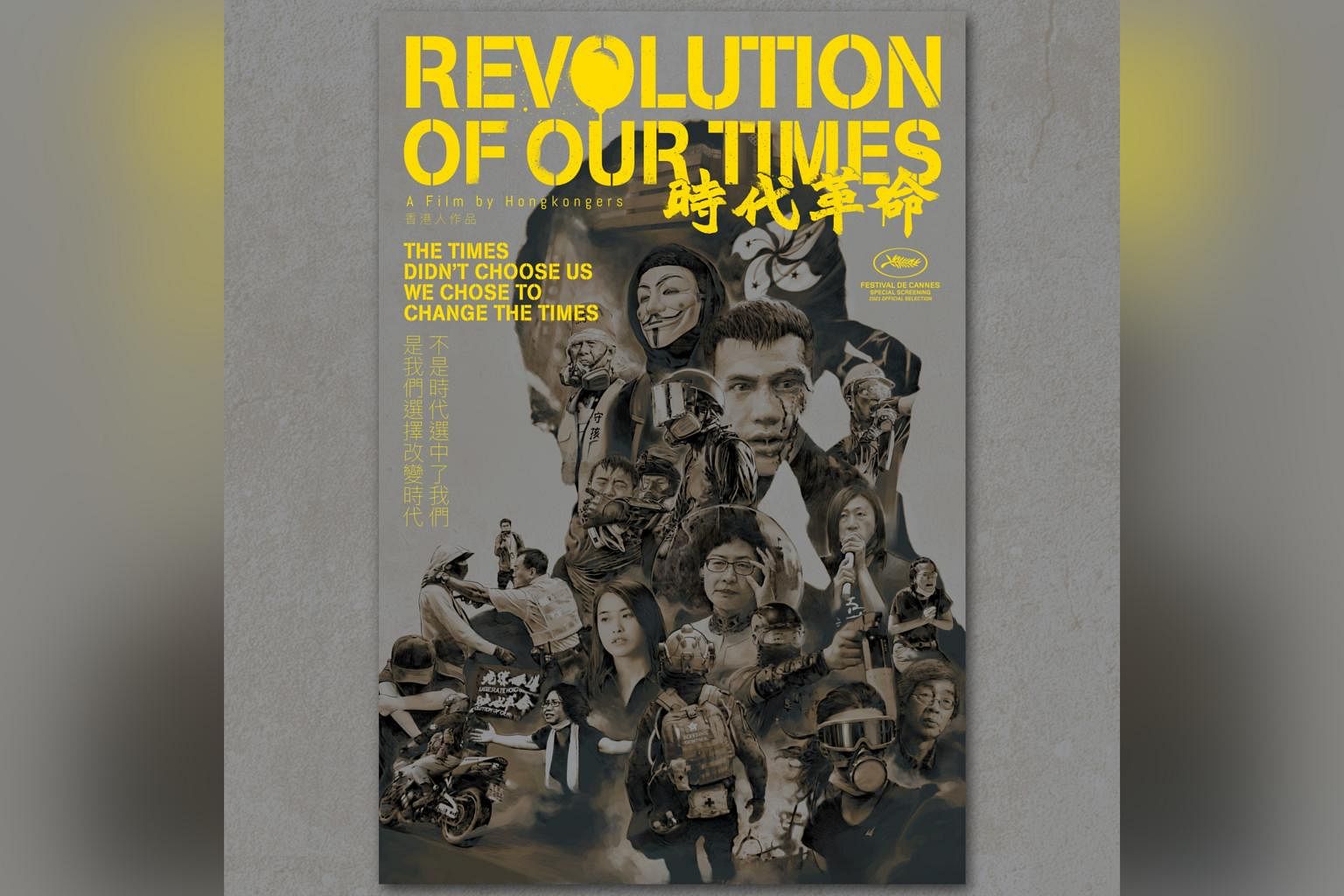Documentary on Hong Kong protests breaks box office records in Taiwan
Sign up now: Get insights on Asia's fast-moving developments

Revolution Of Our Times has broken box office records to become the highest-grossing Chinese-language documentary made outside Taiwan.
PHOTO: REVOLUTION OF OUR TIMES/FACEBOOK
TAIPEI - Taiwanese people have been making tracks to catch a new film that has become the talk of the town - not about a man in a bat suit, but the massive pro-democracy protests that rocked Hong Kong in 2019.
"In a time where authoritarianism is expanding, we especially need to see people's determination and bravery in standing up for democracy," said Taiwan President Tsai Ing-wen in a Facebook post on Wednesday (March 9), as she called for Taiwan's youth particularly to watch Revolution Of Our Times, to see "what Hong Kongers want us to know".
Since its release in Taiwan on Feb 25, the documentary by Hong Kong film-maker Kiwi Chow has broken box office records to become the highest-grossing Chinese-language documentary made outside Taiwan.
As of Wednesday, the documentary had grossed around NT$17 million (S$806,000) in two weeks, the film's distributor said in a press release on the same day. In comparison, DC Films' The Batman raked in NT$15.34 million over its opening weekend on March 4-6.
The documentary is centred on the months of unrest when Hong Kongers took to the streets to protest a proposed extradition law that people feared would subject them to arbitrary detention and unfair trials on the mainland.
The film covers the subject through interviews and recordings of the rallies.
What began as small rallies in March that year steadily grew and by June, over two million had taken to the streets against the Bill. The demonstrations snowballed into violent clashes between police officers and protesters, who were making the so-called five demands, including the withdrawal of the Bill, an independent investigation of the police and the right to elect their own leaders.
In September 2019, the Bill was finally withdrawn, but the protests tapered off only after the coronavirus pandemic started in early 2020.
The film, which won Taiwan's Golden Horse Award last year for best documentary feature, is banned in Hong Kong.
But it has struck a chord in Taiwan, where residents feel empathy for Hong Kong and share a mutual disapproval of China's "one country, two systems" formula for governing the former British colony - the same plan Beijing has for Taiwan, which it views as a breakaway province to be reunified by force if necessary.
"I'm proud that Taiwan is a free place where the film can be screened in theatres," said Ms Lynn Chen, 35, a financial specialist.
She cried during the film, "because as Taiwanese, we have the luxury to go about our day after watching it, but Hong Kongers cannot, this despair is their reality".
The entire theatre was silent when the film ended, said 32-year-old sous chef Chang Chuan-chieh.
"I think everyone was in shock (because of the violence and the desperation). Hong Kong and Taiwan are often compared because both face Beijing's plans to take over completely.
"But the message shown when the film ended talks about how... Taiwan used to be like today's Hong Kong, so I think from a historical perspective, authoritarian rule will one day end (for Hong Kong)," said Ms Chang.
She was referring to how Taiwan was under the authoritarian rule of Kuomintang from 1945 till 1996, when the party won the island's first direct presidential election.
Hong Kong returned to Chinese rule from the British in 1997 on the promise that Beijing would leave its capitalist economy and political freedoms untouched for 50 years.
"Taiwan should support Hong Kong and lift up democracy in Chinese society," Ms Chang said.
Ms Tsai, who is from the pro-independence Democratic Progressive Party, also reiterated Taiwan's determination to back Hong Kong. Many politicians have echoed her sentiments, including Premier Su Tseng-chang, who asked Taiwanese to cherish the freedom and democracy they enjoy, and Vice-President William Lai, who swore to "never forget the Hong Kongers' endurance and courage".
In June 2020, Taiwan established an office to help Hong Kong residents who wished to come to Taiwan for work or studies as a way to seek refuge. While the Cabinet-level Mainland Affairs Council, which the office reports to, declined to comment, local media reported in January that some 130 Hong Kongers had received assistance in relocating to Taiwan.
Based on numbers from the National Immigration Agency, the number of Hong Kongers moving to Taiwan with visas for temporary residency jumped from 5,858 people in 2019 to 10,813 in 2020, and 11,173 in 2021.
The number of Hong Kong residents granted permanent residency in Taiwan has also grown from 1,474 in 2019 to 1,576 in 2020 and 1,685 in 2021.
But despite the growth, additional help promised by the Taiwanese government is still pending.
Last September, the Taiwan Interior Ministry announced plans to ease restrictions for Hong Kong and Macau residents on residence permit extensions, to ultimately allow those with master's and doctorate degrees to be granted permanent residency. But the proposal has yet to reach the Parliament.
A week after the documentary's premiere in Taiwan, civic groups took to the streets calling for the government to consider even more changes in the law to make it easier for Hong Kongers to apply for residency, especially those who are fleeing political persecution in Hong Kong.
"I'm hoping the government will actually amend the laws to make it possible for Taiwan to take in more political refugees from Hong Kong, or screening the documentary wouldn't mean a thing," said Ms Chen.
Taiwan's box office rankings for the March 4-6 weekend
1. Batman - NT$15.34 million (S$730,00)
2. Jujutsu Kaisen 0: The Movie - NT$8.85 million
3. Revolution Of Our Times - NT$1.84 million


